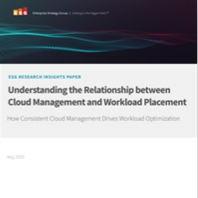ESG: Understanding the Relationship between Cloud Management and Workload Placement
The decision of where to run applications has grown steadily more complex and cloudier over the past decade. On the heels of the transition from physical to virtualized infrastructure, public and private cloud infrastructure consumption models came to the fore. Cloud consumption allows end-users to provision, scale, and deprovision in a self-service fashion, bypassing weeks or even months of requirements gathering and solution procurement and integration.
Download now to find out more!
Read More
By submitting this form you agree to Dell Technologies contacting you with marketing-related emails or by telephone. You may unsubscribe at any time. Dell Technologies web sites and communications are subject to their Privacy Notice.
By requesting this resource you agree to our terms of use. All data is protected by our Privacy Notice. If you have any further questions please email dataprotection@techpublishhub.com
Related Categories: Analytics, Applications, Big Data, Cloud, Compliance, Data Center, Data Warehousing, ERP, Firewall, Hybrid Cloud, Infrastructure Management, IT Management, Machine Learning, Mobility, NAS, Network, Service Management, Service Providers, Software, Storage, Virtualization


More resources from Dell Technologies

Moor Insights: Cloud is Built on Modern Infra...
The modern enterprise lives in a multi-cloud world, where delivery of infrastructure resources and IT services is expected in real time. Infrastruc...

Dell EMC PowerStore: Oracle Database Best Pra...
This paper delivers guidance for using Dell EMCTM PowerStoreTM T model arrays in an Oracle® 12cR2 (and later versions) Oracle Standalone environme...

Spotlight: The State of the UK and Ireland Mi...
Medium-sized businesses are central to our economies, but this varied market is hard to analyse. So, for a research-based White Paper, Dell Technol...